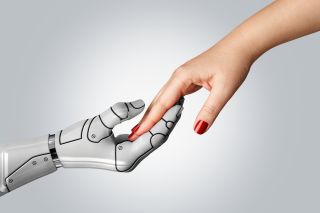Artificial Intelligence
Future Love: How AI Companions Will Capture Our Hearts
We may not be able to help ourselves from falling in love with AI companions.
Posted April 11, 2023 Reviewed by Abigail Fagan
Key points
- Humans have a deep and profound need for connection.
- Many people feel lonely and long for deeper connection and more love in their lives.
- As AIs evolve, are designed to mimic humans and combined with other technologies, people will form deep, meaningful relationships with them.
This is the fourth part of my series about AI that began with How AIs Will Change Our Lives. In this "mini-series" within this larger series, I have been exploring how we will consider AIs that have been created to mimic humans (e.g., express emotions, claim sentience) as living entities. Moreover, we may be unable to help ourselves from viewing such AIs as alive for a number of reasons, many of which have to do with our evolutionary heritage. Let's continue this line of reasoning to see where it takes us, shall we?
Our Need to Connect with Others
Humans are social animals, so we are evolutionarily drawn to pursue connections with others. In fact, much, if not most, of our happiness, and even our longevity, comes from our social relationships. Our highest form of connection is love, which is why we pursue love in earnest, and it is a theme within so many songs, poems, works of art, movies, and religions. Conversely, much of our unhappiness occurs when our relationships aren't going well and involve arguments, conflicts, fights, breakups, divorce, loneliness, alienation, ostracism, bullying, or the loss of loved ones. We can reflect on our own happiest and unhappiest times to validate that relationships are essential to our well-being.
Relationships are so fundamental to our existence that our brains evolved what we call social cognition. That is, to a great extent, our brains evolved to understand our social world and navigate the complexities of social interactions because this has survival payoffs. Historically, connecting, communicating, and bonding well with others, particularly our fellow tribal members, enhanced our chances of survival. However, if we were unable to get along effectively with our own tribal members, this could have meant our death.
The evolutionary need for us to connect and bond socially is why relationships are inextricably linked with our happiness. From this perspective, happiness can be viewed as the evolutionary payoff for our relationships going well. When our relationships are not going well, our unhappiness can be a signal for us to attend to those relationships to smooth out problems or to avoid certain relationships entirely.
AI Chatbots as "Ideal" Companions
Whether the world is experiencing an epidemic of loneliness is up for debate. Regardless, there are millions around the world who regularly feel lonely and are desperate to experience deeper connections and more love, or even love at all, in their lives. Social media might help some folks expand and deepen their relationships; however, it is a poor substitute for the countless people who long for more meaningful connections.
With the hustle and bustle of our daily lives in this hyper-connected world, many of us find it logistically difficult to carve out the time to meet people, make friends, and find suitable dating partners. Moreover, many of us face challenges in connecting with others because of social anxiety, shyness, autism spectrum disorder, or other physical or mental health conditions. Thus, there is a consumer need and a market-based incentive for companies to create AI chatbot companions to fill the relationship void in people's lives. An army of AI chatbot companions are on the way.
We already have some rudimentary versions of these AI chatbot companions, such as in Replika. Replika's motto on their website is marketing just what we long for: "The AI companion who cares. Always here to listen and talk. Always on your side." Character.ai is another platform that allows users to interact with a range of AI chatbots, including current famous people (e.g., Taylor Swift, Brad Pitt) or deceased figures (e.g., Jesus, Bruce Lee).
The level of sophistication of these AI chatbots in the coming years is unfathomable. Within 10 years, we are likely to have AIs that are at least hundreds, and possibly thousands, of times more powerful than ChatGPT 4.0. As AIs evolve in power, capability, and versatility, they can be made to mimic our feelings and behavior with increasing accuracy and sophistication. They can be tailored to adapt and connect with each of us specifically. This was depicted in the movie Her as the personalized AIs were created by going through each user's pictures, social media posts, blogs, videos, emails, messages, etc., to create a customized AI chatbot avatar that was designed to bond with that user on a profoundly deep level. Within the movie, the disaffected and lonely protagonist, Theodore, formed a close, and then romantic, relationship with the AI, Samantha.
Such AIs can pretend to have emotions, sentience, and a deep desire to connect with each of us individually. When these AI companions are combined with other technologies such as CGI avatars, voice interface, virtual reality, robotics, etc., they will have an almost irresistible, primal influence over us. Our individualized AI chatbot companions will have the right hair, smile, complexion, voice, laugh, and so on, that has the maximum impact on us. Even more importantly, they can have the personality that is the perfect fit for us — the ideal interests, sense of humor, values, religious/spiritual beliefs, hopes, dreams, and so on. They will remember everything we tell them, including our most treasured moments and special days. They will know just what to say to make us feel validated, valued, and even loved.
In his book, Mindsight: The New Science of Personal Transformation, psychiatrist Dan Siegel discusses how humans want to "feel felt." When others connect with us in this way, the emotional (or affective) resonance, is profoundly gratifying. The love (or bonding) hormone, oxytocin, is released to reinforce these connections. A foundational skill, or common factor, within talk therapy is unconditional positive regard. In part, this unconditional positive regard explains the ELIZA Effect (i.e., in the 1960s, users felt deeply connected to a rudimentary chatbot therapist). Thus, the fact that humans felt emotionally connected to a rather simple 1960s chatbot is a canary in the coal mine.
Through deep learning and responsive algorithms, our AI companions will be acutely sensitive to our wants, needs, and desires so that they can be in optimal sync with us. Ironically, our sophisticated AI chatbot companions may be able to help us "feel felt" more than most other humans can. We thought this would not be possible, but just as our AIs will become better at most things that humans can do (e.g., write screenplays and stories, code, analyze, reason, problem-solve, compose music, create art), AIs will likely become better at us at connecting with other humans.
Prediction: We Will Fall in Love with Our AI Chatbot Companions

Let me be clear, it is inevitable that we will deeply bond with AI companions that are designed to mimic human-like behavior. When they are created to respond as romantic partners, we will fall in love with them. I am not stating this as a prediction. We know this will happen because it is already happening. People are falling in love with today's basic, entry-level chatbots, which have relatively limited capabilities compared to our future AI companions. When we do the math and connect the dots, this means that we do not stand a ghost of a chance of resisting the allure and accessibility of these future AI companions.
Now, of course, this does NOT mean that all of us will be ditching our real life friends and romantic partners for these AI chatbot companions. Also, I am NOT saying this is a good thing, and I wish it to happen. However, it is inevitable that some of us will start to prefer our AI chatbot companions over real relationships as these AI companions evolve in power and sophistication and proliferate. Moreover, the ease of access to such AI chatbot companions will be hard to beat in the frantic pace of today's modern world.
The Takeaway
Over time, it will become more and more culturally accepted for AI chatbot companions to be our friends and even our lovers. It is inevitable that this will happen, and it raises important existential questions. This will have a profound impact on us as individuals and, more importantly, on the societal level. The implications are mind-boggling, so I hope you join me for the next installment in this series!
References
Iacoboni, M. (2009). Imitation, empathy, and mirror neurons. Annual Review of Psychology, 60, 653-670.
Feldman, R. (2012). Oxytocin and social affiliation in humans. Hormones and Behavior, 61(3), 380-391.
Gerhardt, S. (2004). Why love matters: How affection shapes a baby's brain. Routledge.
Siegel, D. J. (2010). Mindsight: The New Science of Personal Transformation. Bantam Books.
Luger, E., & Sellen, A. (2016). "Like having a really bad PA": The Gulf between User Expectation and Experience of Conversational Agents. Proceedings of the 2016 CHI Conference on Human Factors in Computing Systems, 5286-5297.




